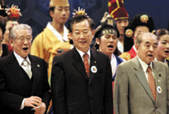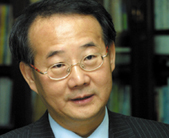Korean Wave All the Rage
- Korea's inbound tourist market cashes in on Hallyu to promote the domestic tourism industry
 Hallyu, or Korean Wave, has now become the buzzword of the local culture and tourism sector in Asia. The frenzy for Korean culture apparently originated from Asians' fad for Korean-made hit dramas such as Daejanggeum and Winter Sonata coupled with Korean superstars like BoA, Bae Yong-jun and Choi Ji-woo.
Hallyu, or Korean Wave, has now become the buzzword of the local culture and tourism sector in Asia. The frenzy for Korean culture apparently originated from Asians' fad for Korean-made hit dramas such as Daejanggeum and Winter Sonata coupled with Korean superstars like BoA, Bae Yong-jun and Choi Ji-woo.
In particular, Winter Sonata has become a huge hit and "Yonsama," (the Japanese nick name of Bae Yong-jun) the hero of the love story drama, has been in vogue since Japan's public broadcasting network aired the show. The fad has escalated into a boom for learning things Korean, including cuisine and language on top of Japanese's rush to locations of the drama such as Nami-seom Islet.
A Korean researcher at a privately-run institute estimates that the economic effects of the "Yonsama Syndrome" stands at as much as 3 trillion won. The top Korean singer, BoA, dubbed as "a walking enterprise," has raked in more than 100 billion won during her last two years' performances in Japan.
Rev. Hyungak, a Harvard Graduate School-educated Buddhist monk, made a presentation on the Buddhist world in Paris, serving as an opportunity for France's public broadcasting networks to launch a program introducing Korean Buddhism. 
Even fans of Korean superstars in Latin America have formed clubs one after another.
Korean Wave has also swept Germany, a gate to Europe, since mid-January. The epicenter of Hallyu was Stuttgart, where Europe's most important public exhibition for caravanning, motoring and tourism, the CMT 2005 was held Jan 15-22, with an estimated 590,000 residents participating. About 200,000 visitors out of the total overwhelmed the Korean pavilion, showing a keen interest in traditional Korean culture and tourism. The audiences applauded the musical and dance performances of the Anseong City Namsadang Baudeogi Pungmuldan and showing of Korean films.
More and more Germans are expected to have opportunities to appreciate Korean culture and tourism as the German government has designated 2005 the "Year of Korea". As a guest of honor, Korea will participate in such events as the Frankfurt Book Fair, slated for Oct. 19-23.
Reflecting on recent developments, the contents and style of Korea's publicity materials have been changed. The appearance of such Korean Hallyu superstars as Choi Ji-woo and Lee Byung-hon have replaced the previous strategy of showing picturesque scenes of the nation's rivers and mountains changing from season to season.
In Jeju Island last November major U.S. media outlets, including NBC, gave prominent coverage of the Shinhan Korea Golf Championship, the first PGA event in Korea and Asia. In particular, the broadcasts carried footage of major Korean tourist attractions, including Bulguk Temple, Jeju women divers and tangerines during some of the prime time hours of the Thanksgiving season.
Korean culture and tourism policymakers and experts have taken pains to further evolve Hallyu into something that could serve as an engine for the development of Korea's tourism industry.
Ji Il-hyun, executive vice president for overseas marketing at the Korea National Tourism Organization (KNTO), praises Hallyu marketing, aimed at cashing in on foreigners' immersion in Korean culture to attract inbound tourists, whenever he meets with people.
Ji said, "Korean Wave has been a great boon for attracting tourists to Korea so far." Korea lured 5.82 million inbound tourists last year, a 22.1 percent surge from 2003, thanks to the success of Hallyu.
Even though competition with rival countries, including Japan, is likely to heat up this year, the KNTO executive vice president is still optimistic about Korea's 2005 target of attracting 6.5 million inbound tourists.
Reversing its policy goal of promoting the outbound tourist market, Japan has put energy into luring more inbound foreign tourists. Japan has launched an offensive armed with such incentives as exemption of entry visas for Chinese, Hong Kong and Taiwanese residents and lower hotel rates.
Overcoming such unfavorable factors as the appreciation of the Korean won and Korea's hotel rates standing at $300(which are almost similar to those of Japan but more expensive than those in Hawaii) Ji said, "Korea is making efforts to diversify and upgrade sightseeing and entertainment attractions so that foreign tourists can stay and enjoy Korea for longer periods. Such locations of Winter Sonata as Whimoon High School in Seoul, Nami-seom Islet in Gyeonggi Province, and Junsangi's house in Chuncheon have already become a magnet for attracting Japanese female Hallyu enthusiasts, including those in their 40s".
The effects of Korean Wave are enormous, and the types of Hallyu-related tourist products vary. The tours include such exotic and fantastic things as the appreciation of Korean art performances in prestigious culture centers and staying at a jjimjilbang(Korean sauna). Beauty and cooking are also made available as a means of fascinating visitors from Japan, China and Southeast Asian countries. Cases in point are the Daejanggeum Theme Park in Yangju, Gyeonggi Province that debuted last December at the filming location of the MBC-TV hit drama and Hwaseong Fortress in the province. The theme park has changed into a major tourist attraction with an average of 800 people, mostly from China and Taiwan, visiting each day.
Daejanggeum, the royal cook turned royal physician who acted as the heroine of the drama, has prompted domestic and foreign audiences to turn to ancient Korean royal cuisine and Oriental medicine. Korea is putting on the market such tourist courses connected with ancient Korean royal dining courses and herbal medicines.
Korea's bid to capitalize on Korean Wave has paid off. Tours to Korea have been diversified and upgraded with rates more than tripling. Japanese tour products, for instance, fetch 70,000 yen and 100,000 yen each for a three-night and four-day stay at Lotte Hotel in Seoul with a tour to Nami-seom Islet, and a four-night and five-day stay at Lotte hotel with a ski tour to Yongpyong Resort respectively. In the past, Korean tours catering to the Japanese were sold at 30,000 yen. A special ski tour catering to Japanese tourists is marketed for 140,000 yen for a four-night and five-day one with the chance to meet Choi Ji-woo, the heroine of Winter Sonata.
Korea and Japan have declared the year 2005 as the Korea-Japan friendship year on the occasion of the 40th anniversary of the establishment of diplomatic ties between Korea and Japan. Korea aims at attracting 3 million Japanese visitors, Ji said. nw
3Fl, 292-47, Shindang 6-dong, Chung-gu, Seoul, Korea 100-456
Tel : 82-2-2235-6114 / Fax : 82-2-2235-0799